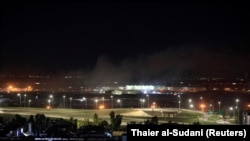Late February 15, rockets struck the airport in Erbil, Iraqi Kurdistan’s capital and the host city for U.S.-led international troops.
Fourteen rockets were fired, three of which hit Erbil airport, where the international coalition forces are based. A civilian contractor was killed, and nine others were injured, including a U.S. service member, coalition spokesman Wayne Marotto reported on Twitter.
SITE Intelligence Group, an American non-governmental organization that tracks online activity of white supremacist and jihadist organizations, said that a Shiite militia group calling itself “Saraya Awliya al-Dam” claimed responsibility on February 16. SITE translated the group’s name as “Guardians of Blood,” and published the group’s follow-up statement, which said the United States was the main target.
Typically for terrorist groups, “Guardians of Blood” made several false and exaggerated statements in claiming responsibility for the attack, including that 24 rockets were launched and struck the coalition base, blasting it “to rubble” and killing American soldiers and a senior officer.
Multiple sources have debunked these claims.
Verified by reliable sources, videos from Erbil showed that rockets hit civilian neighborhoods. Reuters photographs showed that six of the 10 attack victims were civilians: one was killed and five were injured.
Five hours after the attack, Kurdistan’s Interior Ministry said the rockets were fired from a Kia automobile “between Erbil and Gwer,” a small town 18 miles east of the base.
“Last night’s attack employed the same method and technique used in a previous assault on the Erbil airport,” the ministry said in a statement. It released photographs showing 107mm Katyusha rocket shells and a launcher with three unlaunched rockets mounted on a destroyed vehicle.
Katyusha rockets were used in previous attacks, including the December 2020 attack on the U.S. Embassy in Baghdad and an October 2020 attack on the Erbil airport. In each of these and other cases, the perpetrators were identified as Iran-backed Shiite militia.
Iran's support programs to Iraqi Shiite militia are "very robust," and date back to 1980s, according to the researchers at the Combating Terrorism Center, West Point. Tehran sponsors basic and advanced paramilitary training at camps in Iran and Lebanon, and has been arming proxies with more sophisticated missiles in addition to the militia's "sizable stockpile of unguided 107mm and 122mm rockets, manufactured both locally and in Iran," the Center for Strategic and International Studies reported in 2019.
Iran denied any ties with the attack and the group that committed it.
“Iran rejects the ‘suspicious rumors’ circulating about the rocket attack that targeted a US airbase in Erbil and condemns ‘suspicious attempts’ to link the incident to the Islamic Republic,” the Iranian state news agency PressTV quoted Saeed Khatibzadeh, a spokesman for Iran’s Foreign Ministry, as saying.
Despite Iran’s denials, security sources believe it backs the Guardians of Blood as a cover for its secret operations in Iraq.
“Either Iran is responsible for helping to indirectly fund/arm this group, and it is directly responsible for their activities, or the group is merely a cover for the IRGC” (the Islamic Revolutionary Guard Corps, the Iranian regime’s national security force), Evan Kohlmann, co-founder of the risk intelligence group Flashpoint told Polygraph.info.
He added: “An influential former Kataib Hezbollah fighter told me back in August that one of the attacks carried out by Saraya Awliya al-Dam in Mosul – the only attack it has carried out north of Baghdad other than the latest rocket strike in Erbil – was too sophisticated to be the work of Iraqi insurgents and was likely arranged by the IRGC.”
Kataib Hezbollah is an Iraqi Shiite paramilitary group.
An Iraqi intelligence source told the U.S. government-funded satellite TV channel Alhurra that “the Awliya al-Dam Brigades are a group directly linked to the Iranian Revolutionary Guard” and “already the vanguard of a selected group of Kataib Hezbollah Brigades, trained to carry out high-quality operations.”
The growing list of proxies makes the attacks attribution more difficult and helps Iran in maintaining plausible deniability, the U.S. Institute of Peace reported on January 13.
Among other Shiite militias in Iraq, Kataib Hezbollah and Asaib Ahl al-Haq are widely seen as Iranian proxy groups. The U.S. government has designated both as foreign terrorist organizations.





